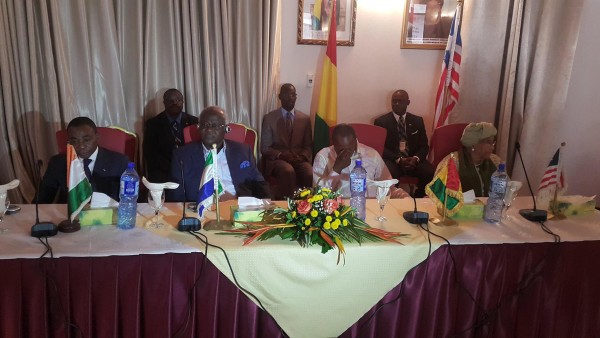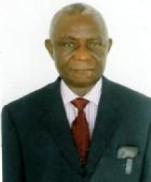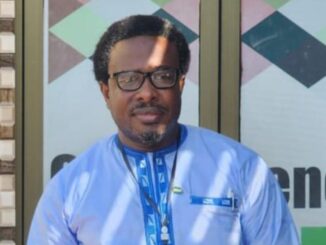
On Sunday June 28, 2015, the leaders of the Mano River Union (MRU) concluded the 3rd Extraordinary Summit on Ebola held in the Guinean capital, Conakry. A communique was issued at the end of the summit, re-emphasizing that the current top priority remains the achievement of resilient zero infections in Guinea and Sierra Leone, revitalising of health care delivery systems, restoring livelihoods and revamping the economies of the three worst affected countries.
Presidents Dr Ernest Bai Koroma (Sierra Leone), Ellen Johnson-Sirleaf (Liberia), Professor Alpha Konde (Guinea) as well as Mr. Charles Koffi Diby, Senior Minister and Minister of Foreign Affairs, representing Ivorian President Allassane Ouattara also agreed on the sub-regional Post-Ebola socio-economic recovery programme against the background of the upcoming UN Pledging Conference in New York on July 9 – 10, 2015.
This follows the MRU Ministerial Meeting held in Conakry on June 20 and 21, 2015, which reviewed and validated the consistency between the sub-regional programme and national recovery plans. The MRU Ministerial Meeting also approved the financing and implementation arrangements for those programmes, and lastly, provided guidance to resource mobilisation.
In the just concluded summit, the Heads of State and Government of the MRU declared that the conclusions and recommendations of the Ministerial Meeting held in Conakry on 20th – 21st June 2015 were in place. They also adopted the priorities and costs of the sub-regional and Ebola Recovery Programme, as well as the Institutional and Financing Framework. This is to ensure effective implementation to returning the worst affected Member States to normalcy and resilience.
The Head of States also noted with satisfaction the remarkable progress both in the drastic reduction of infections and the end of Ebola in Liberia. They committed themselves to achieving resilient zero infections in Guinea and Sierra Leone.
The leaders also reiterated deep appreciation to the International community for its unwavering support to the affected Member States in the fight against the disease. They also urged for continued engagement.
Earlier this year, development partners in Brussels and Washington made commitments to support the three worst affected countries for the post-Ebola recovery. In reference to that commitment, the Heads of MRU called on key partners, in particular, the African Development Bank, the World Bank, the International Monetary Fund, and the European Union to join the UN Secretary General at the highest level during the upcoming July 10th Pledging Conference in New York.
Taking into consideration the urgent need to pursue Post-Ebola socio-economic recovery of the worst affected MRU Member States, the leaders adopted, among other things, the following:
![]() (1) Two-year sub-regional and national priorities for ease of implementation. The sub-regional plan is clustered into two levels: level one is estimated at US$ 1.76 billion, focusing on (a) health, water, sanitation and hygiene; (b) governance, peace and security; (c) agriculture, fisheries and food security; (d) gender, youth and social protection; (e) programme management and monitoring, and (f) private sector development.
(1) Two-year sub-regional and national priorities for ease of implementation. The sub-regional plan is clustered into two levels: level one is estimated at US$ 1.76 billion, focusing on (a) health, water, sanitation and hygiene; (b) governance, peace and security; (c) agriculture, fisheries and food security; (d) gender, youth and social protection; (e) programme management and monitoring, and (f) private sector development.
![]() Level two estimated at US$ 2.24 billion focused on (a) sub-regional roads, (b) energy access; and (c) information and communication technology.
Level two estimated at US$ 2.24 billion focused on (a) sub-regional roads, (b) energy access; and (c) information and communication technology.
![]() MRU Heads of States further reaffirmed their call for the establishment of a single MRU Consolidated Ebola Recovery Trust Fund (CERTF), with allocation and disbursement arrangements to be determined by the MRU in consultation with partners.
MRU Heads of States further reaffirmed their call for the establishment of a single MRU Consolidated Ebola Recovery Trust Fund (CERTF), with allocation and disbursement arrangements to be determined by the MRU in consultation with partners.
![]() Furthermore, the leaders of the MRU appealed to all countries not just to lift restrictions against Liberia which is now free from the disease, but also resume immediately their flights in the MRU sub-region.
Furthermore, the leaders of the MRU appealed to all countries not just to lift restrictions against Liberia which is now free from the disease, but also resume immediately their flights in the MRU sub-region.
![]() The communique expressed condolences to the families who have lost their loved ones due to the Ebola virus and paid special tribute to health personnel who died in the service of their compatriots.
The communique expressed condolences to the families who have lost their loved ones due to the Ebola virus and paid special tribute to health personnel who died in the service of their compatriots.
SHCU



